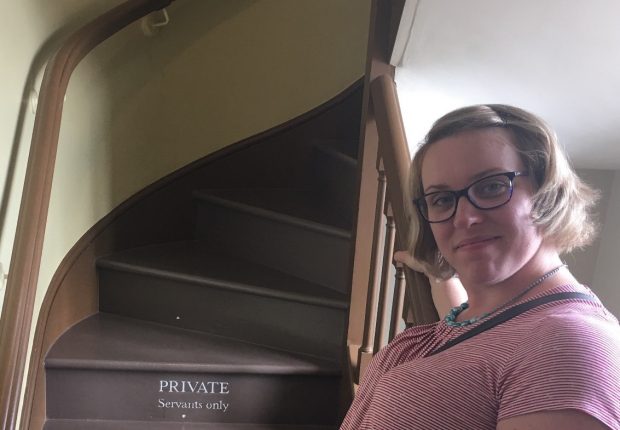Profile
Job: Historic Reviewer
Organisation: Home Office
Years in Public Service: 6 (with a 2 year gap before my current post spent completing my master’s degree)
My grandmother/mother was a…
My granny was a long-serving medical receptionist, in addition to being grand matriarch, expert pasty-maker (a primary export from my home town of Plymouth) and care-giver to me and my brother whilst our mum worked all the hours in order to raise us on her own (which I have always been immensely proud of – never feeling less than other two parent family units).
Granny would always collect us after school and ask us about our day whilst we ate a lovely dinner in her comfortable kitchen. Granny, alongside her 2 sisters, taught me the importance of truly connecting with others – with empathy and concern, expressing your beliefs despite the consequences and in a voice that was authoritative without nastiness.
My mum was a Civil Servant (as was my auntie – it’s now a family thing as my brother is too) working in a variety of posts on or near the frontline, whose poise and professional work ethic has heavily impressed on my own. Always doing a job ‘properly’, never shirking or shying away from taking on difficult tasks, mum taught me that good work done well is its own reward.
Throughout many holidays around Cornwall we always had the best of times, usually with very little spent, which has inspired my own insistence on value for money (but not to the detriment of fun!). Mum has always been behind me, encouraging me to live life to the full and pursue my dreams, as well as teaching me to be liberal minded and keep striving for the very best.
From both my granny and my mum I developed a headstrong way of striving forward, whilst remaining resilient to what life can throw at you, something which has become increasingly important as I have relocated to London, taken on education alongside full time work and travelled around the world (a 27-hour coach from London to Budapest being one notable example!)
Me in a paragraph
I come from a working-class background, am the first generation to go to university, and am the torch carrier for strong forthright women in my family – all of which have developed my interests in marginal or outcast groups in women’s history.
I feel strongly about understanding women who have historically been written off due to gender, class status, mental health or inclusivity issues, because they still inform current debates, views and actions so strongly.
I believe that finding out why a view was formed and showing the lack of evidence or plain stupidity of a position arms us against further challenges to women’s equality, treatment and freedoms – an essential in present times!
My recent research (conducted for a master’s degree I completed last year) focused on female domestic servants migrating to the metropolis navigating employers and mental illness, as well as investigating links between working-class women, illegitimate children and state benefits that resulted in them being labelled ‘feeble-minded’ (similar but not a direct relation to mental ability/learning disabilities today). I have plans to continue researching female domestic servants and the impact the job had on their mental health.
My role
I have recently joined the Home Office as a Historic Reviewer, a key part of ensuring records are historically preserved at The National Archives – the repository for government (and other organisational) papers based at Kew, London.
Looking at historic material, thinking that you are the first to have seen it for quite some time, and that those topics you come across are infinitely fascinating plays into a love of history cultivated throughout my degrees.
My role also ensures that researchers who visit The National Archives are able to access records, or if unable to due to the Freedom of Information or Data Protection Acts (amongst others) have a clear understanding of the reasons why closures are in place.
If I had a magic wand, what I would do to accelerate gender equality?
Throughout many debates I have had, one thing that strongly stands out is lack of experience that breeds a lack of understanding. I would like to wave a wand and have all people be born with awareness but not the actual experience of awful things that have happened or are happening to women, which have denied them an equal footing and continue to marginalise and invalidate their voices.
Anything else you’d like to say
I think it is really important that we all keep pushing forward and in ways no matter how large or small try to spread awareness, educate and change opinions which remain resistant to accepting equality. I like to think my research on women’s history helps this by suggesting we might not have moved as far away from some horrible conceptions as we thought.
Subscribe to this blog for more stories from inspirational women. You can also follow Suffrage Centenary on Twitter.

Recent Comments